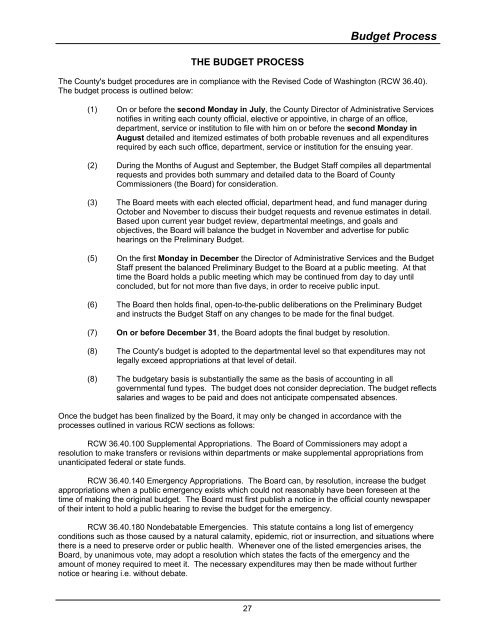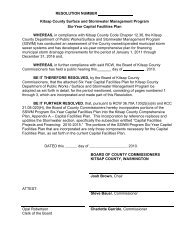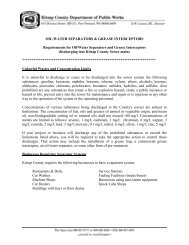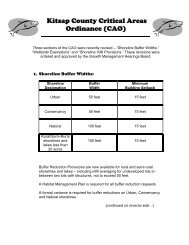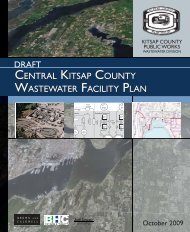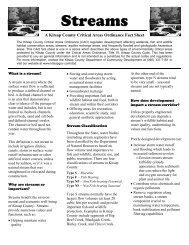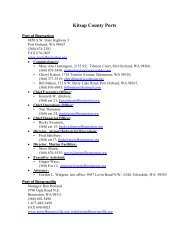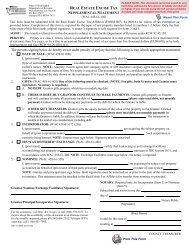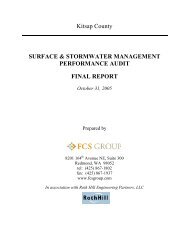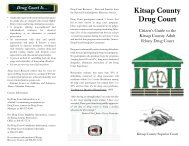2008 Budget Book - Kitsap County Government
2008 Budget Book - Kitsap County Government
2008 Budget Book - Kitsap County Government
You also want an ePaper? Increase the reach of your titles
YUMPU automatically turns print PDFs into web optimized ePapers that Google loves.
<strong>Budget</strong> Process<br />
THE BUDGET PROCESS<br />
The <strong>County</strong>'s budget procedures are in compliance with the Revised Code of Washington (RCW 36.40).<br />
The budget process is outlined below:<br />
(1) On or before the second Monday in July, the <strong>County</strong> Director of Administrative Services<br />
notifies in writing each county official, elective or appointive, in charge of an office,<br />
department, service or institution to file with him on or before the second Monday in<br />
August detailed and itemized estimates of both probable revenues and all expenditures<br />
required by each such office, department, service or institution for the ensuing year.<br />
(2) During the Months of August and September, the <strong>Budget</strong> Staff compiles all departmental<br />
requests and provides both summary and detailed data to the Board of <strong>County</strong><br />
Commissioners (the Board) for consideration.<br />
(3) The Board meets with each elected official, department head, and fund manager during<br />
October and November to discuss their budget requests and revenue estimates in detail.<br />
Based upon current year budget review, departmental meetings, and goals and<br />
objectives, the Board will balance the budget in November and advertise for public<br />
hearings on the Preliminary <strong>Budget</strong>.<br />
(5) On the first Monday in December the Director of Administrative Services and the <strong>Budget</strong><br />
Staff present the balanced Preliminary <strong>Budget</strong> to the Board at a public meeting. At that<br />
time the Board holds a public meeting which may be continued from day to day until<br />
concluded, but for not more than five days, in order to receive public input.<br />
(6) The Board then holds final, open-to-the-public deliberations on the Preliminary <strong>Budget</strong><br />
and instructs the <strong>Budget</strong> Staff on any changes to be made for the final budget.<br />
(7) On or before December 31, the Board adopts the final budget by resolution.<br />
(8) The <strong>County</strong>'s budget is adopted to the departmental level so that expenditures may not<br />
legally exceed appropriations at that level of detail.<br />
(8) The budgetary basis is substantially the same as the basis of accounting in all<br />
governmental fund types. The budget does not consider depreciation. The budget reflects<br />
salaries and wages to be paid and does not anticipate compensated absences.<br />
Once the budget has been finalized by the Board, it may only be changed in accordance with the<br />
processes outlined in various RCW sections as follows:<br />
RCW 36.40.100 Supplemental Appropriations. The Board of Commissioners may adopt a<br />
resolution to make transfers or revisions within departments or make supplemental appropriations from<br />
unanticipated federal or state funds.<br />
RCW 36.40.140 Emergency Appropriations. The Board can, by resolution, increase the budget<br />
appropriations when a public emergency exists which could not reasonably have been foreseen at the<br />
time of making the original budget. The Board must first publish a notice in the official county newspaper<br />
of their intent to hold a public hearing to revise the budget for the emergency.<br />
RCW 36.40.180 Nondebatable Emergencies. This statute contains a long list of emergency<br />
conditions such as those caused by a natural calamity, epidemic, riot or insurrection, and situations where<br />
there is a need to preserve order or public health. Whenever one of the listed emergencies arises, the<br />
Board, by unanimous vote, may adopt a resolution which states the facts of the emergency and the<br />
amount of money required to meet it. The necessary expenditures may then be made without further<br />
notice or hearing i.e. without debate.<br />
27


